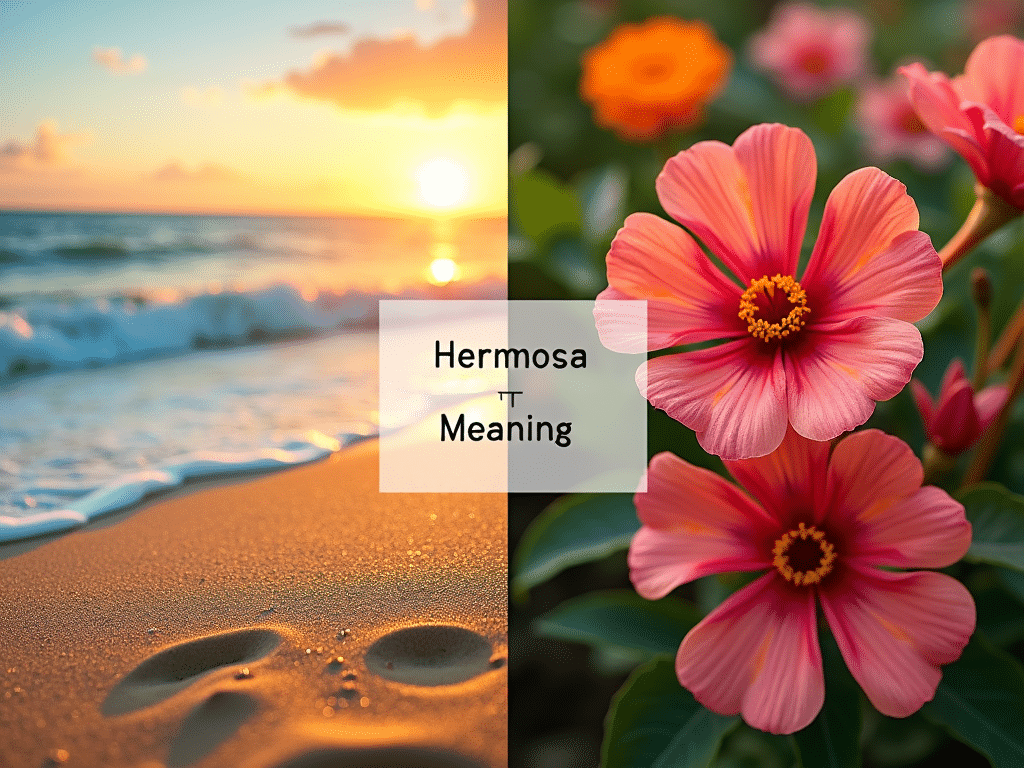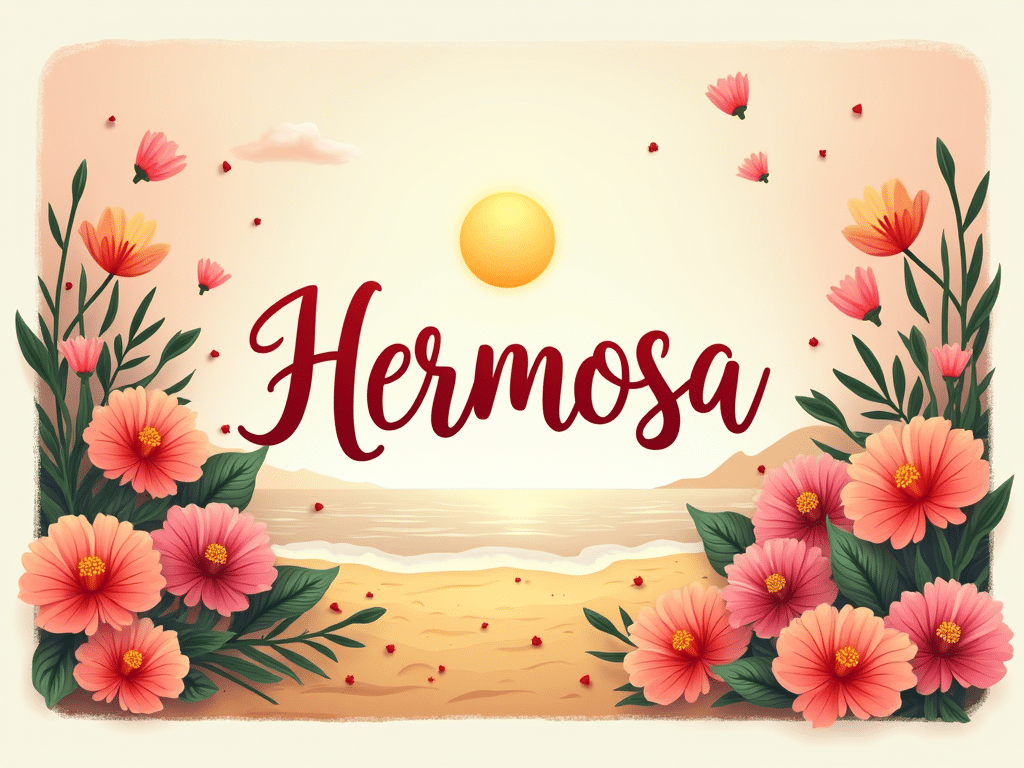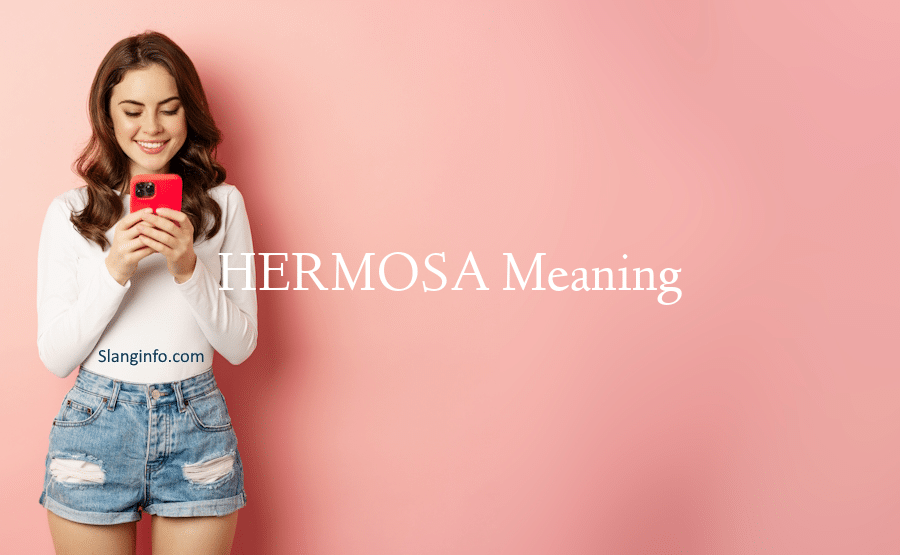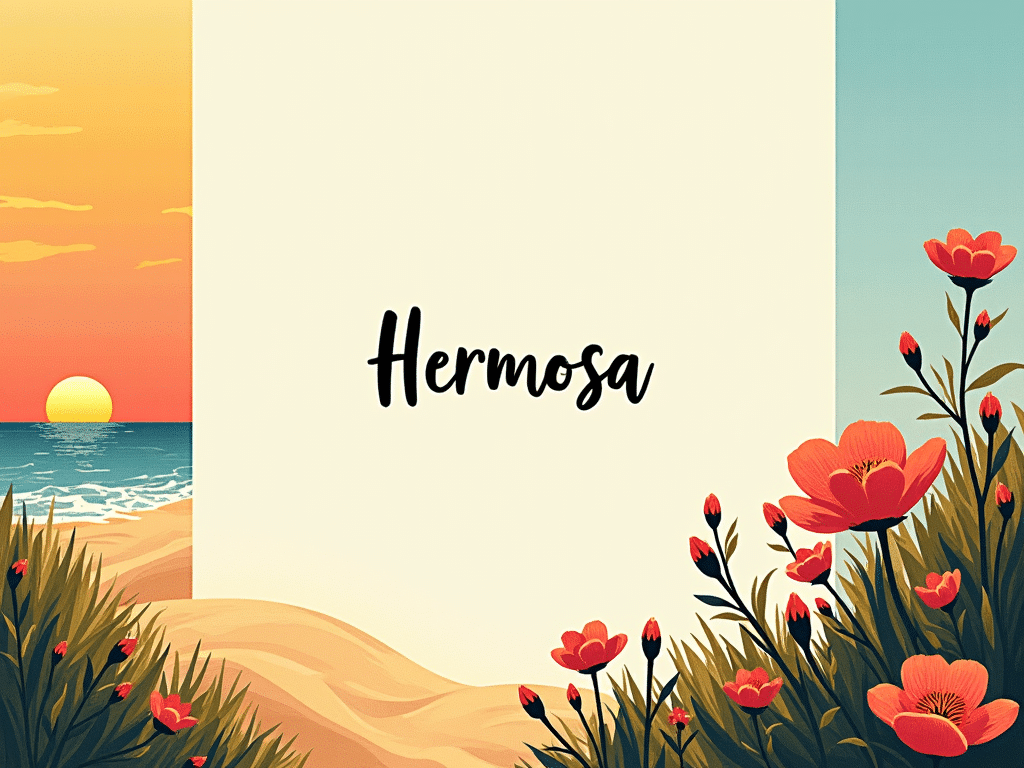Hey there, language lovers! 👋 Ever heard someone say “hermosa” and wondered what it means? Well, you’re in for a treat! This beautiful Spanish word is more than just a compliment – it’s a window into a whole culture. Let’s dive into the world of “hermosa” and unpack everything you need to know about this charming word.
| Key Takeaways |
|---|
| Hermosa means “beautiful” in Spanish (feminine form) |
| Used to describe people, places, and things |
| Has deeper connotations than just physical beauty |
| Common in compliments and expressions of admiration |
| Reflects cultural values in Spanish-speaking countries |
Hermosa Meaning: Exploring the Beauty of This Spanish Word

What Does Hermosa Mean?
Alright, let’s cut to the chase. “Hermosa” is the Spanish word for “beautiful,” but it’s got a bit more oomph to it. It’s like saying someone or something is not just pretty, but knock-your-socks-off gorgeous. 😍
Here’s the deal:
- It’s the feminine form of the adjective (masculine is “hermoso”)
- Used for women, feminine nouns, and sometimes to describe feelings or moments
- Carries a sense of admiration and respect
Think of it as the Spanish equivalent of calling something “stunning” or “breathtaking.” It’s not just about looks – it’s about an overall impression of beauty.
Also read: ICK
The Origin Story: Where Did Hermosa Come From?
Time for a quick history lesson (I promise it won’t be boring). “Hermosa” didn’t just pop up out of nowhere. It’s got some serious linguistic roots:
- Latin Origins: Comes from the Latin word “formosus,” meaning “beautiful”
- Evolution: As Latin morphed into Spanish, “formosus” became “hermoso/hermosa”
- Spread: Became a staple in Spanish language as it spread across the world
Fun fact: The word “formosa” in English (meaning “beautiful”) comes from the same Latin root. It’s like “hermosa” and “formosa” are long-lost language cousins!
How to Use Hermosa Like a Pro

Want to drop “hermosa” into your conversations without sounding like you’re trying too hard? Here’s your game plan:
- Describing People: “Ella es una mujer hermosa” (She’s a beautiful woman)
- Talking About Places: “Qué playa tan hermosa” (What a beautiful beach)
- Expressing Feelings: “Fue una experiencia hermosa” (It was a beautiful experience)
Remember, in Spanish, adjectives usually come after the noun. So it’s “mujer hermosa,” not “hermosa mujer” (unless you’re being poetic).
Pro tip: If you’re complimenting someone directly, you can say “Eres hermosa” (You’re beautiful). Just be sure you know them well enough – it’s a pretty strong compliment!
Also read: Hundo P
Hermosa vs. Other Beauty Words
Spanish has a bunch of words for “beautiful,” but they’re not all created equal. Let’s see how “hermosa” stacks up:
| Word | Meaning | When to Use |
|---|---|---|
| Hermosa | Beautiful (strong) | For significant beauty |
| Bonita | Pretty | For lighter, everyday compliments |
| Guapa | Handsome/Good-looking | More casual, can be used for men and women |
| Linda | Cute/Lovely | For endearing qualities |
“Hermosa” is like the GOAT of Spanish beauty words. It’s the one you pull out when you really want to make an impression.
Hermosa in Pop Culture

“Hermosa” isn’t just for everyday chats – it’s all over music, movies, and literature. Here are some cool ways it pops up:
- Music: Ever heard the song “Eres Tan Hermosa” by Luis Miguel? Total classic.
- Movies: In many Spanish films, calling someone “hermosa” is a big romantic moment.
- Literature: Spanish poets love using “hermosa” to describe everything from women to nature.
It’s like the Spanish-speaking world’s way of saying something is on fleek, but way more poetic.
Also read: SHILL
Hermosa in Different Contexts
Alright, let’s dive deeper into how “hermosa” plays out in real life. This word isn’t just a one-trick pony – it’s got range!
In Everyday Conversations
- Complimenting Someone:
“¡Qué hermosa te ves hoy!” (How beautiful you look today!) - Describing a View:
“La puesta del sol es hermosa.” (The sunset is beautiful.) - Expressing Gratitude:
“Gracias por tus hermosas palabras.” (Thank you for your beautiful words.)
Pro tip: When using “hermosa” to compliment someone, make sure you’re close enough to them. It’s a pretty strong compliment, so you don’t want to come off too strong with strangers!
In Literature and Art
“Hermosa” isn’t just for casual chats. It’s all over books, poems, and paintings too. Here’s how the pros use it:
- Poetry: “Hermosa como la luna” (Beautiful as the moon) – a classic poetic comparison.
- Novels: Characters often describe love interests as “hermosa/o” to emphasize their beauty.
- Art Titles: Many paintings and sculptures use “hermosa” in their names to highlight the beauty they’re capturing.
It’s like the Spanish-speaking world’s way of saying something is on fleek, but way more poetic and timeless.
Hermosa vs. Other Beauty Words: The Showdown
Spanish has a bunch of words for “beautiful,” but they’re not all created equal. Let’s see how “hermosa” stacks up:
| Word | Meaning | When to Use |
|---|---|---|
| Hermosa | Beautiful (strong) | For significant beauty |
| Bonita | Pretty | For lighter, everyday compliments |
| Guapa | Handsome/Good-looking | More casual, can be used for men and women |
| Linda | Cute/Lovely | For endearing qualities |
“Hermosa” is like the GOAT of Spanish beauty words. It’s the one you pull out when you really want to make an impression.
Cultural Impact of Hermosa
Now, let’s get real for a sec. “Hermosa” isn’t just a word – it’s a cultural phenomenon. Here’s why it matters:
- Body Positivity: In many Spanish-speaking countries, calling someone “hermosa” is about more than just looks. It’s about appreciating their whole being.
- Art and Music: Count how many Latin songs have “hermosa” in the title. Spoiler: it’s a lot!
- Place Names: Ever heard of Hermosa Beach in California? Yep, named for its beauty.
It’s pretty wild how one word can say so much about what a culture values, right?
Also read: SMDH
Using Hermosa: Do’s and Don’ts
Let’s wrap this up with some quick tips to keep you “hermosa”-savvy:
Do:
- Use it sincerely – it’s a powerful compliment
- Apply it to things and experiences, not just people
- Learn its different forms (hermoso, hermosura)
Don’t:
- Overuse it – it can lose its charm
- Use it in formal or professional settings unless you’re literally talking about beauty
- Forget that context matters – sometimes “linda” or “bonita” might be more appropriate
Wrapping It Up: Hermosa in a Nutshell
So there you have it – “hermosa” demystified! It’s more than just a word; it’s a gateway to understanding beauty in Spanish-speaking cultures. Whether you’re spilling the tea with friends or trying to describe an amazing sunset, “hermosa” is there to add some linguistic flair.
Remember, language is always evolving. “Hermosa” might be the go-to beauty word now, but who knows what the next big compliment will be? Stay curious, stay respectful, and most importantly, have fun with it!
Got any funny “hermosa” stories? Drop them in the comments below! And if you’re hungry for more Spanish slang knowledge, check out our articles on compa and jajaja. Keep slaying that language game! 😎
P.S. If anyone ever calls you “hermosa/o,” take the compliment! It’s a beautiful thing to be appreciated, no matter what language it’s in.







